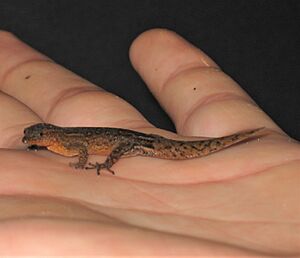Sphaerodactylus klauberi facts for kids
Quick facts for kids Sphaerodactylus klauberi |
|
|---|---|
 |
|
| Conservation status | |
| Scientific classification |
|
| Kingdom: | Animalia |
| Phylum: | Chordata |
| Class: | Reptilia |
| Order: | Squamata |
| Family: | Sphaerodactylidae |
| Genus: | Sphaerodactylus |
| Species: |
S. klauberi
|
| Binomial name | |
| Sphaerodactylus klauberi Grant, 1931
|
|
| Script error: The function "autoWithCaption" does not exist. | |
Script error: No such module "Check for conflicting parameters".
The Sphaerodactylus klauberi is a special kind of gecko. Geckos are small lizards. This particular gecko lives only on the island of Puerto Rico. It's a unique animal found nowhere else in the world!
Contents
Meet Klauber's Dwarf Gecko
This gecko has a few different names. People often call it Klauber's dwarf gecko or Klauber's least gecko. You might also hear it called the Puerto Rican highland sphaero or the Puerto Rican upland gecko. All these names help us know which gecko we're talking about!
How It Got Its Name
The second part of its scientific name, klauberi, is a way to honor someone. It was named after an American scientist named Laurence Monroe Klauber. He studied reptiles and amphibians, so naming this gecko after him was a special tribute.
What Does It Look Like?
The Sphaerodactylus klauberi is one of the bigger kinds of dwarf geckos. It can grow to be about 1.5 inches (37 mm) long, not counting its tail. Its body is usually dark brown with darker spots. These spots get bigger on its tail. The gecko's belly is often orange or reddish-pink, and its throat is gray, sometimes with darker smudges.
Gecko Behavior
Like all geckos in its group, the Sphaerodactylus klauberi doesn't make any sounds. It's a quiet creature! This gecko is mostly active at night, which means it's a nocturnal animal. While you're sleeping, it's out exploring!
What Does It Eat?
This gecko is an insectivore. This means it loves to eat insects! It helps keep the insect population in check in its habitat.
Reproduction and Life Cycle
When a female Sphaerodactylus klauberi is ready, she lays just one egg. This egg has a hard shell and can be as big as her head! After she lays the egg, it takes about 2 to 3 months for the baby gecko to hatch.
Where Does It Live?
You can find the Sphaerodactylus klauberi in different parts of Puerto Rico. They live at various heights, from about 160 feet (50 meters) up to 3,600 feet (1,097 meters) above sea level. You might spot them on the ground or on low branches in certain areas of the Caribbean National Rain Forest. These areas include the Tabonuco, Colorado, and Palma Sierra sections.
See also
- List of amphibians and reptiles of Puerto Rico
- Fauna of Puerto Rico
- List of endemic fauna of Puerto Rico
 | William M. Jackson |
 | Juan E. Gilbert |
 | Neil deGrasse Tyson |


